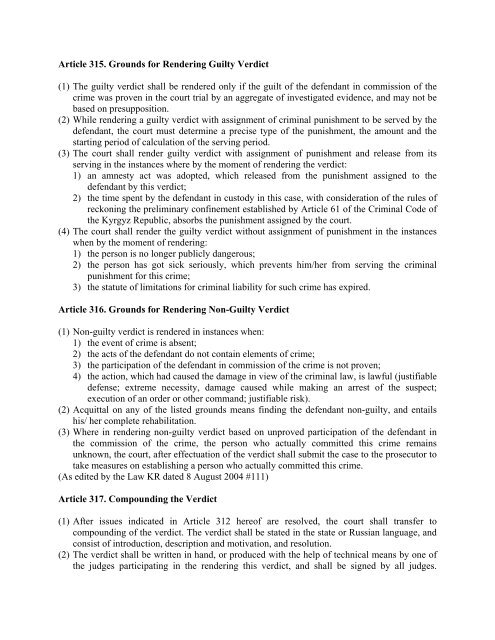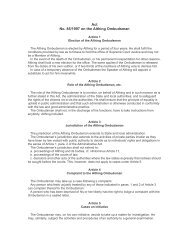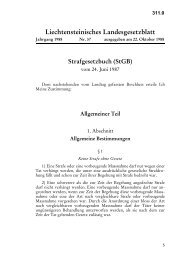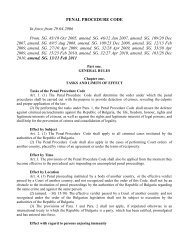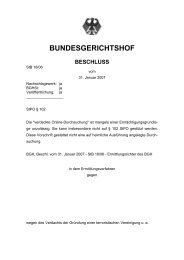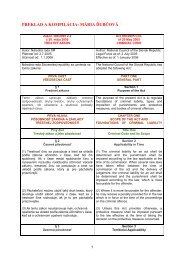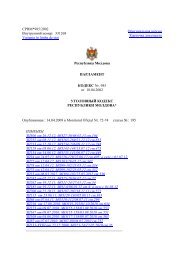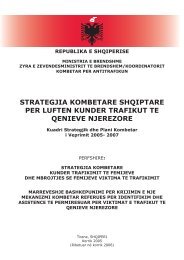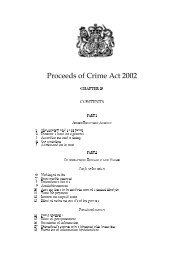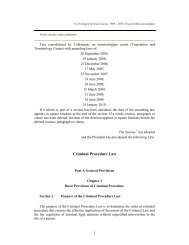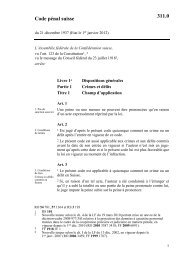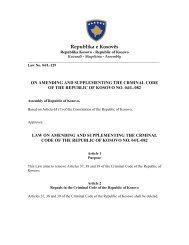Criminal Procedure Code of the Kyrgyz Republic - Legislationline
Criminal Procedure Code of the Kyrgyz Republic - Legislationline
Criminal Procedure Code of the Kyrgyz Republic - Legislationline
Create successful ePaper yourself
Turn your PDF publications into a flip-book with our unique Google optimized e-Paper software.
Article 315. Grounds for Rendering Guilty Verdict<br />
(1) The guilty verdict shall be rendered only if <strong>the</strong> guilt <strong>of</strong> <strong>the</strong> defendant in commission <strong>of</strong> <strong>the</strong><br />
crime was proven in <strong>the</strong> court trial by an aggregate <strong>of</strong> investigated evidence, and may not be<br />
based on presupposition.<br />
(2) While rendering a guilty verdict with assignment <strong>of</strong> criminal punishment to be served by <strong>the</strong><br />
defendant, <strong>the</strong> court must determine a precise type <strong>of</strong> <strong>the</strong> punishment, <strong>the</strong> amount and <strong>the</strong><br />
starting period <strong>of</strong> calculation <strong>of</strong> <strong>the</strong> serving period.<br />
(3) The court shall render guilty verdict with assignment <strong>of</strong> punishment and release from its<br />
serving in <strong>the</strong> instances where by <strong>the</strong> moment <strong>of</strong> rendering <strong>the</strong> verdict:<br />
1) an amnesty act was adopted, which released from <strong>the</strong> punishment assigned to <strong>the</strong><br />
defendant by this verdict;<br />
2) <strong>the</strong> time spent by <strong>the</strong> defendant in custody in this case, with consideration <strong>of</strong> <strong>the</strong> rules <strong>of</strong><br />
reckoning <strong>the</strong> preliminary confinement established by Article 61 <strong>of</strong> <strong>the</strong> <strong>Criminal</strong> <strong>Code</strong> <strong>of</strong><br />
<strong>the</strong> <strong>Kyrgyz</strong> <strong>Republic</strong>, absorbs <strong>the</strong> punishment assigned by <strong>the</strong> court.<br />
(4) The court shall render <strong>the</strong> guilty verdict without assignment <strong>of</strong> punishment in <strong>the</strong> instances<br />
when by <strong>the</strong> moment <strong>of</strong> rendering:<br />
1) <strong>the</strong> person is no longer publicly dangerous;<br />
2) <strong>the</strong> person has got sick seriously, which prevents him/her from serving <strong>the</strong> criminal<br />
punishment for this crime;<br />
3) <strong>the</strong> statute <strong>of</strong> limitations for criminal liability for such crime has expired.<br />
Article 316. Grounds for Rendering Non-Guilty Verdict<br />
(1) Non-guilty verdict is rendered in instances when:<br />
1) <strong>the</strong> event <strong>of</strong> crime is absent;<br />
2) <strong>the</strong> acts <strong>of</strong> <strong>the</strong> defendant do not contain elements <strong>of</strong> crime;<br />
3) <strong>the</strong> participation <strong>of</strong> <strong>the</strong> defendant in commission <strong>of</strong> <strong>the</strong> crime is not proven;<br />
4) <strong>the</strong> action, which had caused <strong>the</strong> damage in view <strong>of</strong> <strong>the</strong> criminal law, is lawful (justifiable<br />
defense; extreme necessity, damage caused while making an arrest <strong>of</strong> <strong>the</strong> suspect;<br />
execution <strong>of</strong> an order or o<strong>the</strong>r command; justifiable risk).<br />
(2) Acquittal on any <strong>of</strong> <strong>the</strong> listed grounds means finding <strong>the</strong> defendant non-guilty, and entails<br />
his/ her complete rehabilitation.<br />
(3) Where in rendering non-guilty verdict based on unproved participation <strong>of</strong> <strong>the</strong> defendant in<br />
<strong>the</strong> commission <strong>of</strong> <strong>the</strong> crime, <strong>the</strong> person who actually committed this crime remains<br />
unknown, <strong>the</strong> court, after effectuation <strong>of</strong> <strong>the</strong> verdict shall submit <strong>the</strong> case to <strong>the</strong> prosecutor to<br />
take measures on establishing a person who actually committed this crime.<br />
(As edited by <strong>the</strong> Law KR dated 8 August 2004 #111)<br />
Article 317. Compounding <strong>the</strong> Verdict<br />
(1) After issues indicated in Article 312 here<strong>of</strong> are resolved, <strong>the</strong> court shall transfer to<br />
compounding <strong>of</strong> <strong>the</strong> verdict. The verdict shall be stated in <strong>the</strong> state or Russian language, and<br />
consist <strong>of</strong> introduction, description and motivation, and resolution.<br />
(2) The verdict shall be written in hand, or produced with <strong>the</strong> help <strong>of</strong> technical means by one <strong>of</strong><br />
<strong>the</strong> judges participating in <strong>the</strong> rendering this verdict, and shall be signed by all judges.


